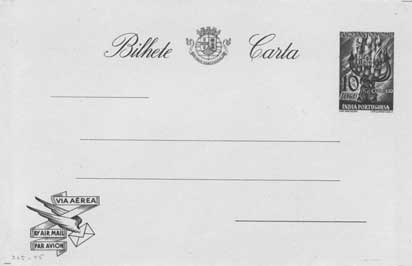Portuguese Possessions in India - July 1954
There was no British India Post Offices in Portuguese India except at Damaun. The records of National Archives of India give informations on the withdrawal of Indian post office from Damaun on or from 1st April 1884. It further states that this post office was either opened in last century or in the beginning of this century, vide Letter No.79 dated 1883 from Governor of Portuguese India to Governor of Bombay.
 |
The British India stamps were introduced from 1st October 1854 and the Portuguese India stamps were issued on 12th August 1871. The British Indian stamps were sold by Portuguese Post Office at Goa in between 1854 and 1877. Before 1871, postage was paid in cash in Portuguese India togather with British stamps, on mail for British India. These stamps were often cancelled by delivery Post Office. After 1871, Portuguese Indian stamps were used in combination with British Indian stamps till 1877. These British Indian stamps are found used from Portuguese Post Offices.
 |
A combination cover from Panjim (GOA) to Karachi dated 15th March 1877,
via Sawantwari and Bombay with Q. V. ½ anna British India stamp
and 10 reis stamp of Portuguese India. Courtsey: Mr. Dhananjay Desai. |
In 1877, both countries agreed to accept each others stamps for the entire journey. Thus, the use of British India stamps in Portuguese India came to an end. And since then, Portuguese India, depended on their own postal system and had their own postage stamps and postal stationeries.
 |
 |
Goa was the main bastion of the Portuguese power in Portuguese
India. Therefore, Freedom Struggle was concentrated at Goa and it was expected
that once Goa is liberated, other enclaves like Daman, Diu and Dadra &
Nagar Haveli would be liberated automatically.
In the beginning of 1946, when it was clear that the Britishers are leaving
India, the desire to liberate Goa became stronger. At this juncture, Dr. Ram
Manohar Lohia visited Goa in 1946 to participate in their Freedom Struggle.
He was arrested and put in Central Jail at Fort Agwad, on 18th June 1946.
This ignited Freedom Movement in Goa, which was met with repression. Unarmed
satyagrahis were mowed down with bullets. After a prolonged struggle, the
movement lost its initial impetus.
After India’s Independence on 15th August 1947, the Indian Government
started persuading the French to withdraw from India. When Indian Government
saw positive hope from the French, they approached the Portuguese Government
to withdraw, but Portuguese remained obdurate and claimed Gao, Daman and Diu
as a province of Portugal.
The Freedom Movement in Goa was in subdued state in 1950. The freedom fighters
were loosing confidence in leading an unequal struggle to a successful end,
without guidance. In this depressing atmosphere, Sri. Atmaram Narsinh Karmalkar
alias Appasaheb, the leader of National Liberation Movement Organisation took
the reagins of the movement in his own hands. Mr. Appasaheb was a bank officer
of Goa Government. He was suspected of supplying informations from the Portuguese
Government side to freedom fighters. As there was no direct proof against
Appasaheb, the Goan Government ordered his transfer from Goa to Africa. But
Appasaheb managed to stay at Bombay. From June 1950 to 1953, Appasaheb remained
in constant touch with Goa movement. He visited incognito Daman and Nagar
Haveli several times to study the situation there.
Another organisation named United Front of Goans (UFG) was also taking part
in liberating Goa. It was established in Bombay in 1950 by Francis Mascernhas,
J M D’souuza, Waman Desai and others. When Captain Fernando da Costa
Rombha became the Chief of Police at Daman in 1953, he didn’t like the
activities of UFG in Daman and Nagar Haveli. Therefore, he invited Francis
Mascerenhas, the President of UFG to discuss the future of Portuguese possessions
in India. After much discussions among leaders of UFG, a delegation under
the leadership of Mascerenhas went to Daman on 13th August 1953. After the
failure of the said meeting, the members of the delegation were ill treated
and detained for three days in Portuguese Police Custody, before being released
outside of the Portuguese border.
Readers are requested to send their query/comments to Mr. Ashok Kumar Bayanwala, 96, Swastik Society,Navarangpura, AHMEDABAD-380009, INDIA or email to Prashant H. Pandya